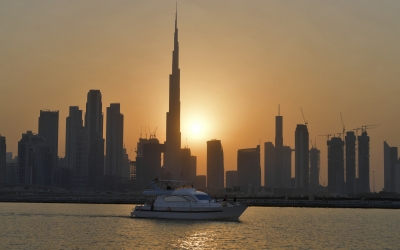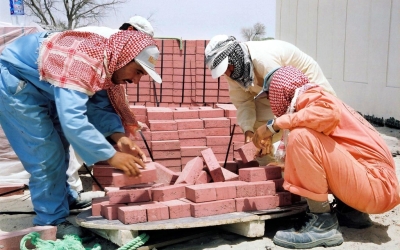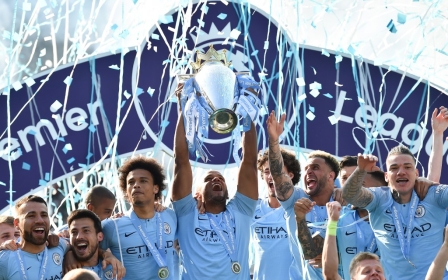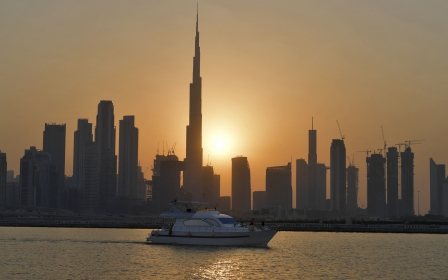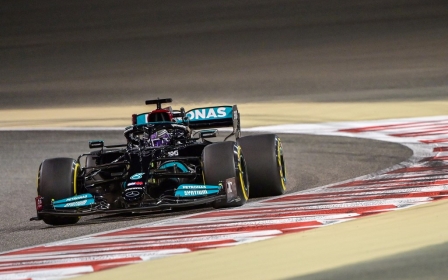Inside Dubai: What was the BBC thinking?
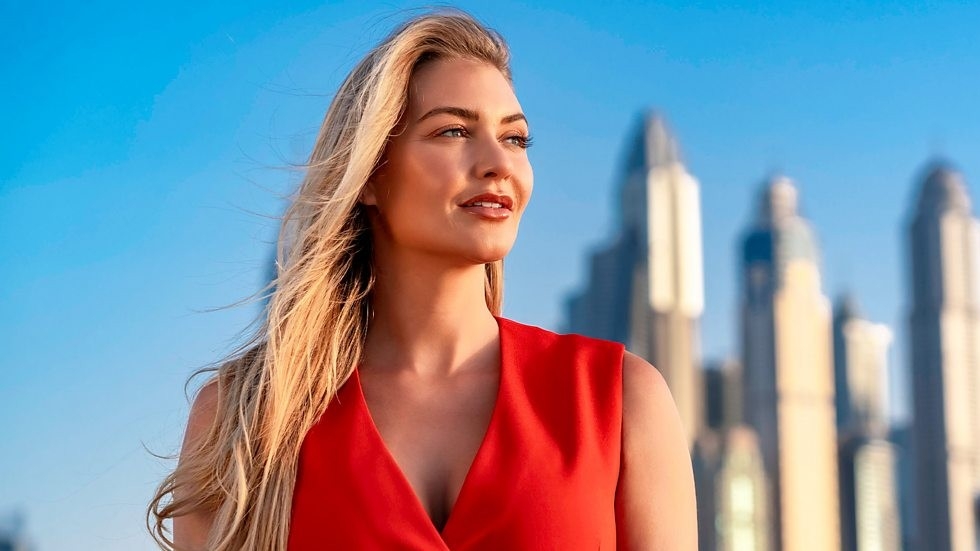
The kindest thing you can say about Inside Dubai: Playground of the Rich, the BBC’s new three-part documentary series, is that by taking a soft, flattering approach to its subject - an approach that was overseen by Emirati officials - it is occasionally very revealing about life in Dubai.
The glossy, reality TV style adopted by the filmmakers produces moments that hard-nosed documentary makers would probably never have captured.
It also reveals - by never actually revealing anything - the awful truth about a world in which capitalist consumption and vast inequality have triumphed; and in which ongoing environmental collapse is always present.
This is the case even if that ongoing crisis is not on our screens, even if the subject of the programme we are watching is a tiny Gulf state that was completely transformed by the burning of fossil fuels.
New MEE newsletter: Jerusalem Dispatch
Sign up to get the latest insights and analysis on Israel-Palestine, alongside Turkey Unpacked and other MEE newsletters
We see the wives of billionaires displaying their shoe collections, admitting they don’t know how much any of the shoes cost. We see wealthy British expats discussing the wisdom contained within the books of Sheikh Mohammed bin Rashid al-Maktoum, the emir of Dubai.
We see property developers trying to sell abandoned man-made islands to nine-year-old princes. We find out that those princes are also Instagram influencers, paid £2,000 per post.
We also meet a YouTuber called Money Kicks, “Dubai’s richest teenager”, the son of billionaire construction magnate Saif Ahmed Belhasa, who spends his time making videos about trainers and luxury cars.
Inside Dubai manages, then, to be both a glossy promotional video for Dubai and a cartoonish portrayal of an “ultra-modern tax haven for the super-rich”. It’s also one that will leave plenty of the emirate's workers feeling let down.
As one current British resident told me: “It’s the worst example of people in Dubai, expat and local… Having lived here for 11 years, it’s very much a home away from home, and it’s just a bit boring when for the umpteenth time it’s being portrayed badly.”
Inside Dubai: What lies beneath
Inside Dubai was produced for the BBC by Spun Gold TV. It follows on from the Inside Monaco series, also subtitled "playground of the rich", which brought in more viewers than any other factual episode on BBC Two during 2020.
It's clear that the production company was hoping to repeat the Monaco trick with Inside Dubai. After all, a fascination with the lives of the super-rich permeates our culture, from the critically acclaimed HBO series Succession to the kind of entertainment pumped out by Spun Gold (other Spun Gold productions include Meghan Markle for President?, How the Other Half Lives Las Vegas and Britain’s Most Luxurious Hotels).
Clare Sillery, the BBC's head of documentary commissioning, said Inside Dubai would "give viewers an insight into the world of those chasing the high life in the emirate of Dubai, a self-styled playground for the wealthy.” The BBC's iPlayer streaming service asks: “What is it really like to live in the desert paradise of Dubai, an ultra-modern tax haven for the super-rich?”
But the interesting things happening in the series are often happening under the surface. The style and method of the filmmaking become part of the story. It’s a series full of shots of luxury cars, deep sunsets, glittering towers and manmade lakes: a Money Kicks YouTube video occupying an hour of BBC prime-time.
The level of consumption on display is vertigo-inducing. The commodity that first made much of this possible - oil - is barely mentioned. Climate change is never referenced.
But climate catastrophe runs through the series. Dubai, as it is shown here, is the furthest frontier in capitalist extraction, a Wild West where to be rich is celebrated, where to live a life of needless, wasteful expense is the whole point, where the desecration of the planet is a necessary by-product of a supercars-in-the-desert lifestyle.
Everything we see is artificial, be it the islands and spits of land created by the government of Dubai, the tans on the 2.5m expats living in the city, or the products enjoyed by the 52,000 millionaires living there in tax-free splendour.
A desert that was once home to nomadic peoples and pearl divers became - with a great deal of British involvement - the towering symbol of a global economic system that has brought the planet to the brink of destruction, a shuddering reminder of the greed and folly of many of the people who rule our world.
Climate change is the awful silent truth that hangs over the vapid success on display.
Watching Inside Dubai is like standing on a melting iceberg while being shown a PowerPoint presentation on the manifold benefits of suncream; or watching a promo video for an oil company while a forest fire rages around you. Many of the characters we see take on the appearance of the musicians on the Titanic, playing their last songs as the ship goes down.
But then today's ultra-rich, from Jeff Bezos to Peter Thiel to Rupert Murdoch, are all finding ways of escaping the human and environmental crises they have helped cause, buying up vast tracts of land in remote locations to see out the apocalypse in comfort.
An absence of 'difficult questions'
The absence of climate change, and of any real interrogation of the political situation in the UAE, is no surprise given the circumstances and intentions of the production.
In a podcast interview with distributor ITV Studios, series producer Teresa Watkins of Spun Gold said that an Emirati government minder had overseen the filming and prevented interviewers from asking “difficult questions”.
Watkins said the BBC had wanted Spun Gold to ask “some of the difficult questions… but it’s quite hard to do that in Dubai.”
Passing references are made to Dubai’s residents having to be “careful what they say”, but the full extent of this well-documented government authoritarianism is never properly elucidated.
Sheikh Mohammed is mentioned again and again by enamoured residents - but nowhere does this British production mention that, during the last couple of years, British courts have ruled that Dubai’s emir was keeping his daughters captive; or that a British court decided he had conducted a campaign of harassment against his ex-wife.
The families of two British men detained in Dubai have told me that the BBC series is a "propaganda video".
A spokesperson for the BBC refuted that, saying that "neither the local production company, the Dubai authorities, Dubai tourism nor any other Dubai institution had editorial control over the series, which rested with the BBC."
The BBC spokesperson said that the programme's commentary "makes clear the wider context of the political system in the emirate, and that criticism of the sheikh by residents and holiday-makers is forbidden; searching questions are shown being asked in the series that the contributors felt unable to answer."
Spun Gold had not replied to my request for comments about the series at the time of publication.
Human Rights Watch reports that while the UAE continues to invest in a "soft power" strategy that paints the country as a "progressive, tolerant and rights-respecting nation", the Gulf nation's "fierce intolerance of criticism" remains on full display.
'Bling, excess and inequality are all part of Dubai's brand and business model. Anyone who steps out of line can be assured of seeing its darker realities'
- Nicholas McGeehan, Gulf researcher
The human rights activist Ahmed Mansoor, academic Nasser bin Ghaith and many other activists and dissidents remain detained without a clear legal basis.
"Dubai has a lengthy rap sheet, as befits an emirate whose ruler has been accused of kidnapping two of his daughters," Gulf researcher Nicholas McGeehan told me.
"Bling, excess and inequality are all part of the brand and business model. Anyone who steps out of line can be assured of seeing its darker realities."
While the BBC has reported on some of these darker realities - the brilliant, harrowing Escape from Dubai is a good example - the commentary on Inside Dubai does not properly illuminate them, preferring to return swiftly to the seemingly inconsequential entertainment that can be had by gawking at the lives of the absurdly rich.
Migrant workers: The human cost
Inside Dubai is not without its affecting moments however.
Hazel, a domestic worker from the Philippines, is one of the army of underpaid (an average salary for such a worker is $400 a month) servants who make Dubai what it is. She sends almost all her salary home. Her son, aged 20, is at university now. Hazel has seen him just once a year since his first birthday.
Sometimes Hazel avoids video calls with her family because they make her cry. It affects her work, she says, when she feels the loneliness of her situation, when she is beset by homesickness. The world has forced her to make a series of inhumane decisions, to travel halfway across the planet simply to earn enough money to get along in life.
It’s better to try to avoid facing the enormous toll that takes. “I’ve been away too long for him,” she says of her son. His childhood is gone now. Her son’s childhood. And she wasn’t there.
It’s not just domestic workers from the Philippines or manual labourers from South Asia who have felt the need to come and work in Dubai.
British supermarket shelf-stacker Mark, from Newcastle, likewise provides Inside Dubai with a bit of heart. He has been offered an £80,000 per year job in the emirate, but it means being separated from his three children.
In the end, he takes the gamble. He isn’t going to go back to stacking shelves.
There is a lesson here, not just about the dominance of fossil fuel capitalism, but also the failures of the British state and the defeat of social democracy in the UK. A lesson not about Dubai, but about the rest of the world.
Like many Brits, Mark feels as though there isn’t much good work or financial security for him at home. He has to go to the wild west now. The sacrifice is great, though. Calling his children, Mark breaks down.
But in the end, stories such as Hazel’s and Mark’s take a distant backseat to the cars, towers and endless consumption that entrance the filmmakers. What we are being shown - lifestyles of horrendous, unsustainable consumption made possible by an authoritarian government and its allies in Britain, the US and elsewhere - is deeply serious.
How we are shown it is deeply unserious. Inside Dubai is a silly piece of work, which treats its audience like fools and encourages them to delight in the consumption and repression destroying our world.
The views expressed in this article belong to the author and do not necessarily reflect the editorial policy of Middle East Eye.
Middle East Eye delivers independent and unrivalled coverage and analysis of the Middle East, North Africa and beyond. To learn more about republishing this content and the associated fees, please fill out this form. More about MEE can be found here.



